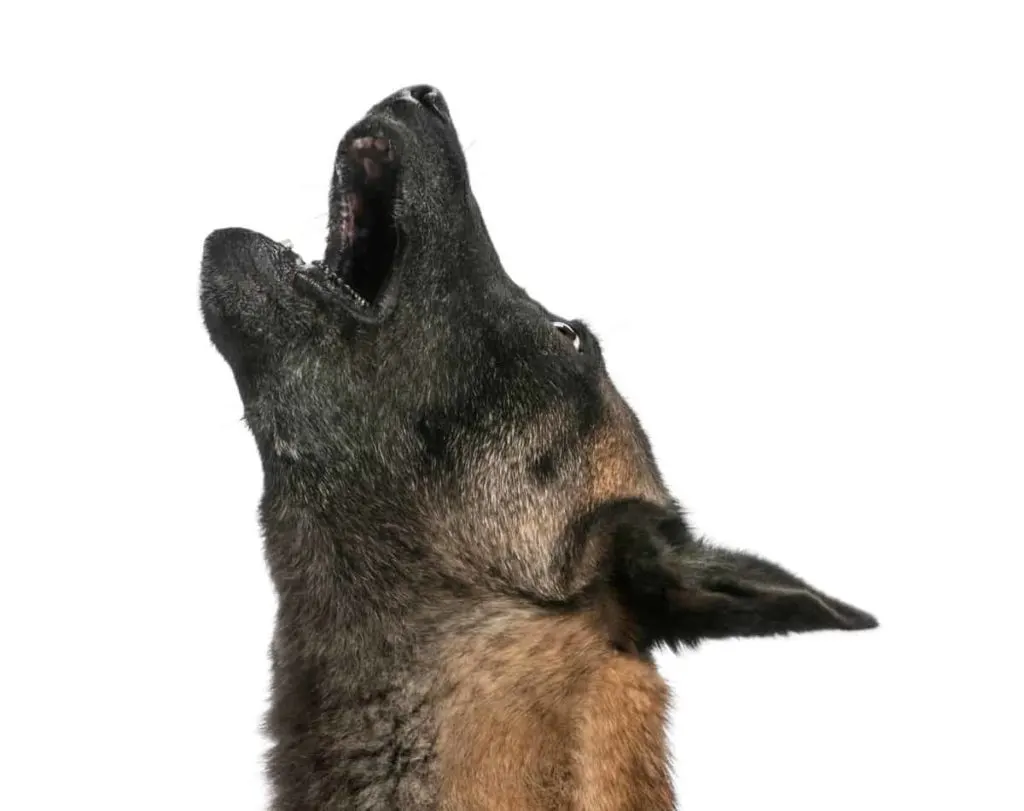
Most dog owners experience their dogs howling from time to time. Sometimes it’s done as a reaction to something in the dog’s environment, and sometimes is for reasons that we just can’t seem to put our finger on. So what’s the deal – why do German Shepherds howl.
German Shepherds are descended from wolves, and there is a space in the primitive part of their brains that instinctually recalls some of their ancestor’s behaviors, and howling is one of them.
In this article, we will take a closer look at just why German Shepherds howl to shed a little light on just what causes this unusual and sometimes entertaining behavior.
Click Here to Jump to a Section
Separation anxiety
Sometimes when I hear my GSD howl, I think “what are you, a wolf?” While this is a playful thought, it is actually largely based in truth.
Wolves howl for the rest of the pack to return. If a wolf gets separated from the pack, or if it just stays back to care for its young while the pack goes out hunting, it will often howl as a way to signal the pack that it wants them to come back.
How this presents itself in today’s modern dog, is that the pack is replaced by the dog’s owner. So when your GSD howls while you are away, it is essentially crying out for you to return home. Simply put, it loves you and it misses you, and your absence causes it anxiety – so it wants you to come back home. To your dog, you and your family are the pack.
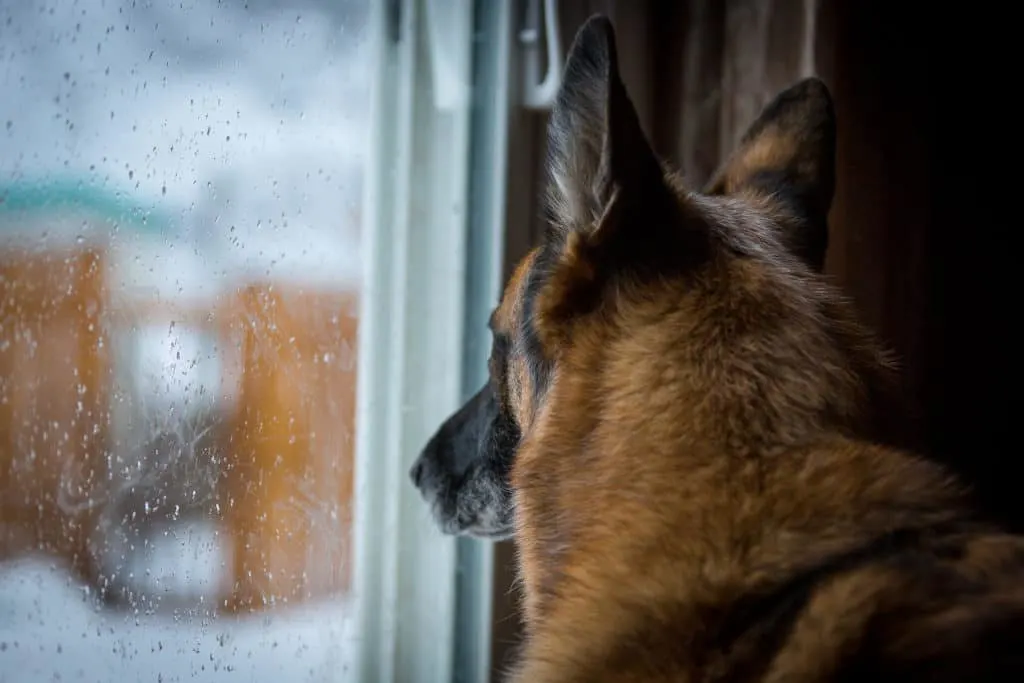
Furthermore, when your dog is howling while you are away, upon your return your dog will feel as though it’s howling was successful. You were gone, it howled, maybe even all day, but you returned.
That’s a success in your dog’s mind. This will only motivate your dog to continue this behavior when you leave the next time.
Just take a look at this German Shepherd in the video below howling while his owners are gone. This video very nicely illustrates the process just described.
One way to tell if your dog is howling due to anxiety is by what you find when you return home. When a dog is howling because it’s anxious, it’s also very common for this behavior to be accompanied by other destructive behaviors.
Your dog needs to vent somehow, and they typically choose to chew something up in your absence when out of anxiety.
If you find that this is the case, it’s important that you take active measures to remedy the situation. Perhaps find the time to check in on your dog more often, or enlist the help of a friend or a pet sitter to visit your dog to assure that it is not going to be stuck there by itself forever.
Defining its territory
Howling for a German Shepherd can at times be a way to warn others that they may be encroaching on its territory. It’s a signal to other dogs or any other animals present that if they I’m any closer to the source of the howl, that the dog is ready to engage with them.
This behavior also originated from wolves and has been specifically analyzed. In a study conducted by Fred H. Harrington and David Mech from the Division of Biological Sciences at the State University of New York, they found that howling played an important role in keeping their young away from danger and also to safeguard their kills.
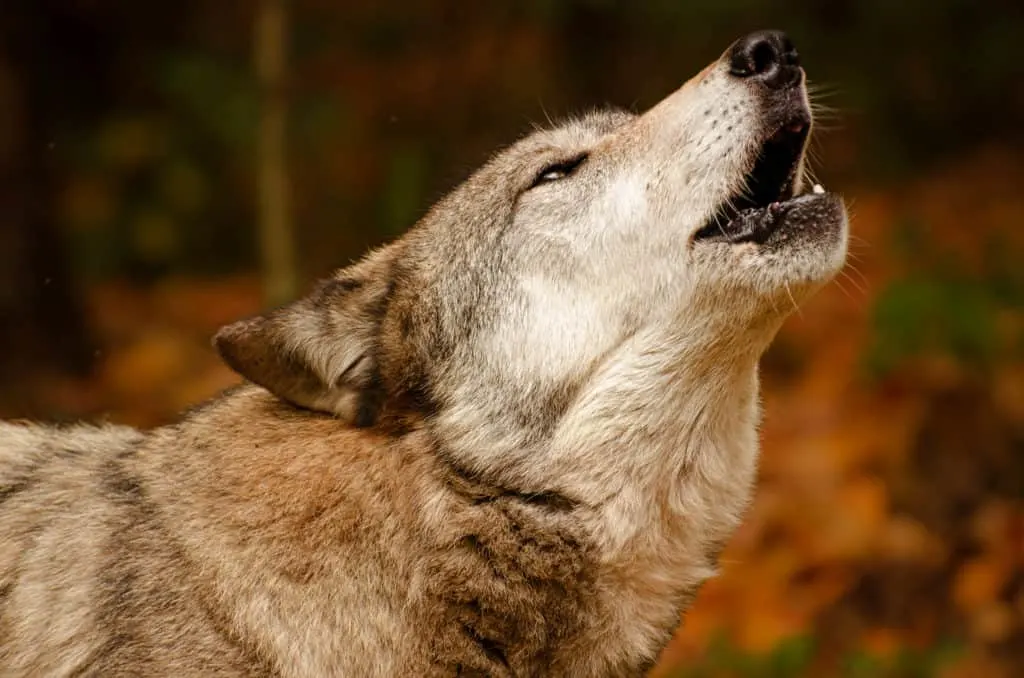
The wolves needed to make sure that they were in exclusive possession of an area when they had made a kill or when there were pups present. By howling, the wolves were able to ensure that their territory did not overlap with another pack’s territory.
This was essential to the preservation of their food and safety of the pups, because if two packs did cross paths, the inevitable violent outcome would jeopardize the safety of both their food and their pups.
When the wolves would howl for these reasons, other packs would heed the warnings and stay away, as it is in neither pack’s interest to jeopardize their food supply or their young.
Howling for attention

This type of howling is very similar to a child crying out simply because it wants your attention. This is not a product of the dog being injured or in need of food, water, or anything else central to its survival.
Of course, a strong argument can be made that your attention is actually essential to your dog’s well-being, so this is your dog’s way of letting you know that it needs your attention.
But it is up to you to weigh the significance of a howl for attention. Ask yourself if you are not giving your dog enough attention, or is your dog simply acting similar to a child craving attention just for the sake of craving attention?
Howling in response to a sound
You may have found that your GSD often howls in response to another sound. While it is amusing to watch and listen to, you dog isn’t doing this just to be cute.
You know how it goes with German Shepherds – they will begin with their famous head tilt, followed by that look in their eyes, you will then notice their lips began to quiver a bit – and you know what’s coming next!
While you do is indeed enjoying himself, there are actually reasons why your dog will howl. Let’s take a look at a few below.
Sirens
You may have noticed that as soon as your dog hears a siren, that siren commands your dog’s attention.
There is a common misunderstanding that the sound of a loud siren hurts your dog’s ears. This seems to make sense because sirens are typically pretty loud and a passing firetruck with blaring sirens can actually be a bit painful for us humans to listen to.
So based on layperson science, many people assume that since dogs have a much more keen sense of hearing then we do, that these siren sounds must be excruciating to them. But this is simply not true.

When you watch your dog howl at a siren, ask yourself, does this dog look like it’s in pain? Undoubtedly answer to that is no, and in fact, you’ll likely notice your dog wagging its tail and seeming to be enjoying him – this is because he is enjoying himself!
The reasons behind this again goes back to your GSD’s earliest ancestors, wolves. Wolves do not use barking as a way to communicate, instead they howl. The things that they communicate are usually one of two things:
- “I’m lonely;” or
- “go away!”
Since your dog is not howling before it hears a siren, clearly it’s not sending out the signal that it’s lonely. So this leads to the conclusion that when your dog hears a siren it howls to communicate “go away!”
And, given the fact that most sirens do in fact go away, as the emergency vehicles are typically on route to somewhere else than the location of the dog, the dog feels successful in its efforts to divert the siren from the area. They then feel as though they have accomplished something. So this leads your dog to howl over and over each time it hears a siren.
Singing
I can recall my dog howling when I would turn on a certain song, when my sister would play the violin, or when he heard other howling or barking sounds on the television.
A scientific analysis has shown that canines actually have the ability to sense pitch. For example, it has been noted that while a wolf is howling, if another wolf joins in at the same time, one of the wolves will change its pitch.
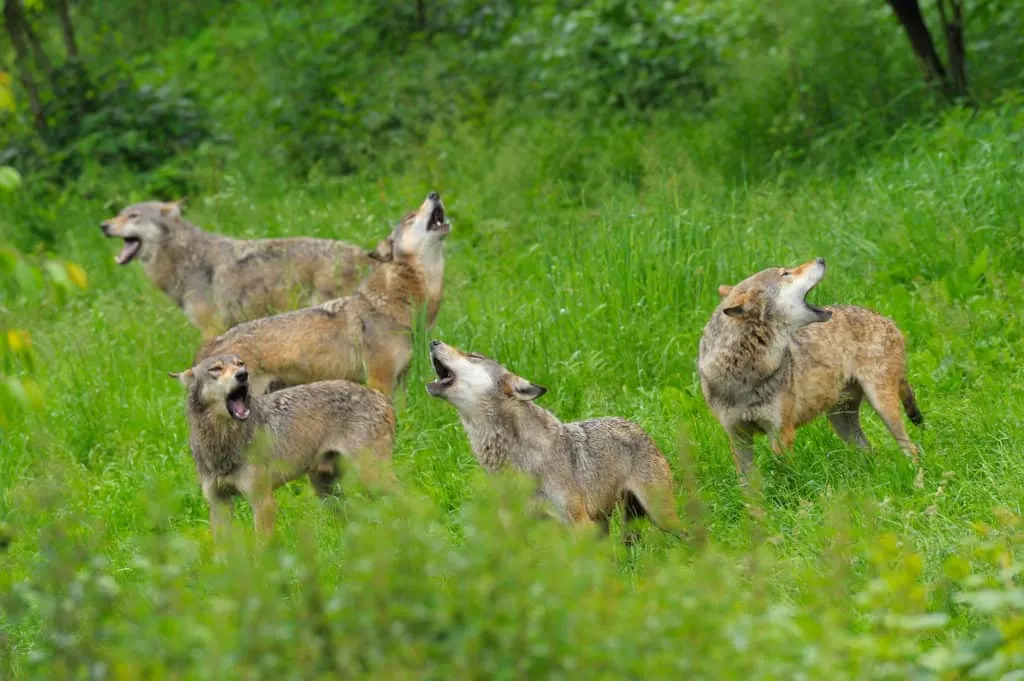
And as more wolves join in, each one will be howling at a different pitch. This is because each wolf wants to be heard, so it is a deliberate action to make sure that it is not sounding at the same pitch as any other wolf. Your dog does the same thing.
The same also holds true of a person who may be singing and holding a particular note in the presence of a dog. The dog hears the sustained pitch and interprets it as some type of communication.
At this point, the dog so it simply wants to join in and offer its two cents as well. It’s up to your imagination what you believe that your dog is saying, but one thing is for sure, it is enjoying itself.
Think about if you heard a conversation between five of your friends all talking at the same time. Even if you could not understand what each one was saying, you would very easily be able to pick out the voices that were participating in that conversation. It’s the same way with your dog.
Musical instruments
If you have any experience with musical instruments around dogs, you’ve probably noticed that there are certain instruments that elicit more of a reaction from dogs than others. Wind instruments tend to prompt dogs to howl fairly often, as do long-drawn-out notes on a violin.

Dogs not only sound off to certain tones, they may sometimes behave differently depending on the type of music. In a study By Debra Wells, a Queen’s University Belfast psychologist, she noted the following after studying dogs being exposed to two different types of music.
“The dogs responded very differently to the three types of music. Pop music produced no noticeable effect. Heavy metal, however, created a bit of canine pandemonium. The dogs became very agitated and started barking. Classical music, on the other hand, caused the dogs to stop barking, become calm, and even settle in one place.”
Debra Wells, Queens University, Belfast.
Howling for pain
Often if a person is injured in some way or another, they express themselves by crying, shouting, or cursing. Howling is also sometimes a dog’s equivalent of a human crying out in pain. So if your dog is howling and you are unable to figure out why, it’s important that you do some further investigating.
Sometimes a dog’s injuries are not very apparent to us, and they do require a closer look. So if you suspect that your dog may be injured, take a close for any places on your dog’s body where it may have in struck by something. Also closely examine its paws and use your fingers to go through its fur to see if there are any open cuts.
If you are unable to locate any physical injury on your dog and it is still howling for some unknown reason, especially if the howling is when the dog is being touched, do not just assume that it is not an injury of some sort.
It is important at this point to contact your veterinarian and have your dog given a thorough checkup. As mentioned, some injuries can easily be missed, and only the trained eye of a veterinarian will be able to understand the cause of them.
Howling due to loneliness
Have ever notice yourself walking by a yard with a chained up dog that is howling? At first glance, you may feel as though the dog is signaling you to go away or to stay away from the property, but sometimes the case is that the dog is actually lonely.
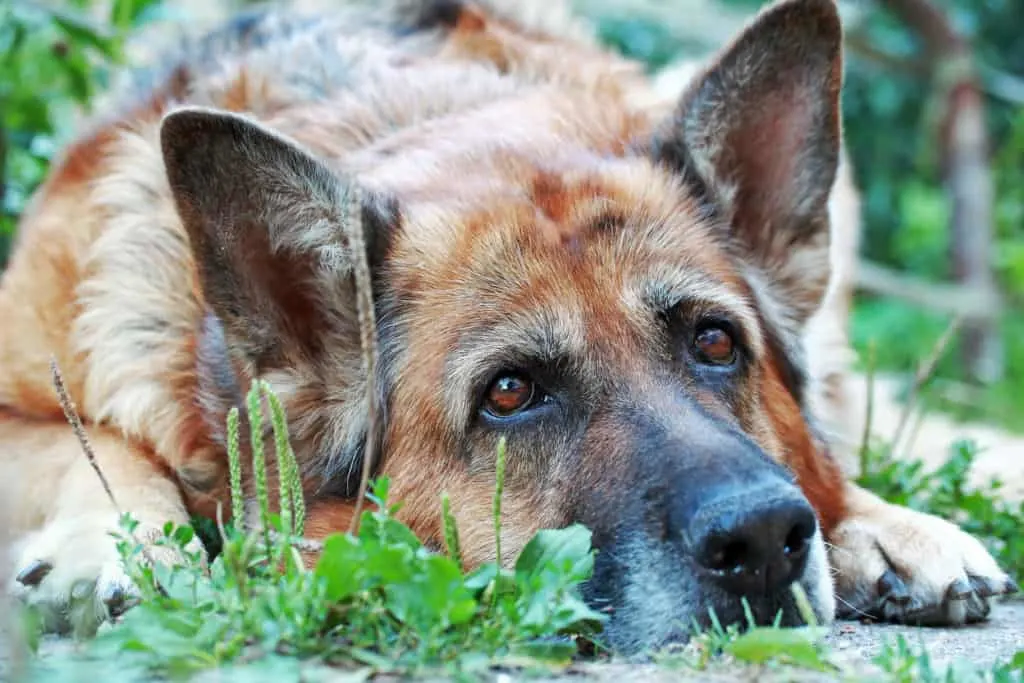
Unfortunate as may be, there are actually many people who simply neglect to give their dogs the attention that they deserve. Instead of providing them with a home where they receive lots of attention and love, they are instead simply chained up outside.
Dog owners sometimes view their dogs simply as a deterrent for intruders and nothing more. They neglect to see that their dogs need attention, so the dogs trapped in these situations are literally howling because they are lonely.
If you do witness this, it’s not advised to approach the owners on your own or try and remedy the situation by yourself. If you suspect that there is a neglected dog that you are aware of, contact your local animal control department or the Humane Society (866-720-2676).
Or if none of these contacts are available, you can also call 9-1-1 to report the abuse.
Howling to gather the pack
While your dog’s ancestors, wolves, would use howling as a way to signal a pack meeting, your dog has a pack also. However, as previously mentioned, your dog’s pack doesn’t consist of other dogs, or wolves for that matter. Your dog’s pack consists of perhaps just you, or you and your family.
So if you return home from work and your dog is expressing himself by howling, he is simply showing you his excitement and joy that the pack has once again reunited. Even you being gone for a short time can seem like an eternity for your dog, so it is overjoyed every time the pack reunites.
Howling to communicate with other dogs
This is one of the most common reasons that your dog will howl – to communicate with other dogs. As we all know, dogs are incredibly social animals, and they crave interaction with other people and other dogs.
You may have noticed if you live in a neighborhood that has dogs, you often hear one dog howling followed by the next, and then perhaps the next, and the next, and so on.
This resembles a chain reaction, not dissimilar to prisoners communicating from cell to cell. This is not to suggest that your dog is a prisoner, but only to illustrate how communication is made when your dog is kept in a fixed place and is unable to physically contact another dog – howling is the next best thing.
Howling is also a very effective way to communicate, as it casts a pretty wide net of sound. How wide this net is cast will depend on a number of different factors, including the dog’s breed, the surrounding terrain, and the weather.
But think about it the next time you hear a dog howl at night. Give some thought to how far away you think that dog is. If you’re out in the country and you hear it, I think a fair estimate would be a mile or more. And chances are that there are certainly other dogs within that mile who are picking up on it.
Final thoughts
As much as we may find our dog’s howling entertaining – and it often is for both you and your dog – make sure that you understand the reasons behind why it is howling.
As discussed in this article, your GSD howls for reasons of pleasure but he may also howl because of emotional or even physical pain. So as a dog owner, it is your responsibility to do your best to try and understand the underlying reason for your dog’s howling.
If you see that your dog is howling for fun, then join in – the more the merrier!
